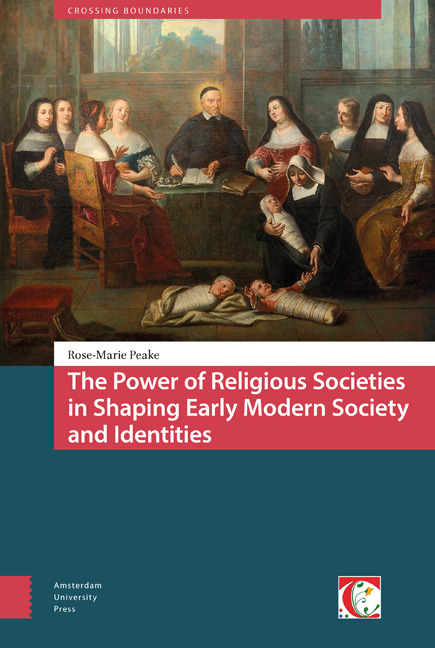Book contents
- Forntmatter
- Contents
- Acknowledgements
- Three Worlds, Three Portraits: Introduction
- 1 At the Cradle: Gender and Power in Seventeenth-century Parisian Society
- 2 Portrait of Louise de Marillac: Ensuring Resources for Moral Management
- 3 Portrait of the Daughter of Charity: Safeguarding the Execution of Moral Management
- 4 Portrait of the Underprivileged: Managing the Ignorant Substitute of Christ
- From Conservative Moral Management to Survival: Conclusions
- Sources
- Note on Vocabulary
- Index
From Conservative Moral Management to Survival: Conclusions
Published online by Cambridge University Press: 21 November 2020
- Forntmatter
- Contents
- Acknowledgements
- Three Worlds, Three Portraits: Introduction
- 1 At the Cradle: Gender and Power in Seventeenth-century Parisian Society
- 2 Portrait of Louise de Marillac: Ensuring Resources for Moral Management
- 3 Portrait of the Daughter of Charity: Safeguarding the Execution of Moral Management
- 4 Portrait of the Underprivileged: Managing the Ignorant Substitute of Christ
- From Conservative Moral Management to Survival: Conclusions
- Sources
- Note on Vocabulary
- Index
Summary
Abstract
The conclusion brings together the main findings of the book. It argues that as a whole the book has shown that the value system the Daughters of Charity promoted through their moral management was rather conservative and attached to medieval mentalities. The chapter points out that although most religious companies operate on the principles of moral management, the Daughters of Charity were unique in their systematic and holistic implementation. This is one very important reason for the survival of the Company well into the 21st century. Louise de Marillac was canonized in 1934, and the Company employs today more than 14 000 sisters in 94 countries. It is one of the most important Catholic organizations in France.
Keywords: early modern Catholicism; canonization; moral management; religious identity; medieval mentalities
For one reason or another, early modern historiography has been widely preoccupied with novelty: the Reformations, both Protestant and Catholic, along with the societal and legal changes brought about by the gradual emergence of the modern state are often seen as important watersheds concluding the Middle Ages and initiating a new era in European history. This study, however, challenges this outlook. By discussing the way the French Catholic Company of the Daughters of Charity shaped identities and society through its moral management activities during the first half of the seventeenth century, the study found that it was rather tradition and conservatism instead of novelty and innovation that characterized the mentalities of the Company.
Conservative moral management was not, however, an end in itself. The study suggested that it was an important means to safeguard the active mission of the Company and hence its survival. Judging by the success of the Company, these activities were carried out wisely. Louise de Marillac is the only canonized founder of an unenclosed seventeenth-century French female community and her Company the most dynamic one to have survived into the twenty-first century. The characteristics of moral management and image moulding were not unique to the Daughters of Charity. Most religious communities operate on Rules and speeches delivered by the directors aiming to implement a certain value system. The Daughters of Charity were the only unenclosed Company to implement their value system by means of a systematic method.
- Type
- Chapter
- Information
- Publisher: Amsterdam University PressPrint publication year: 2020

